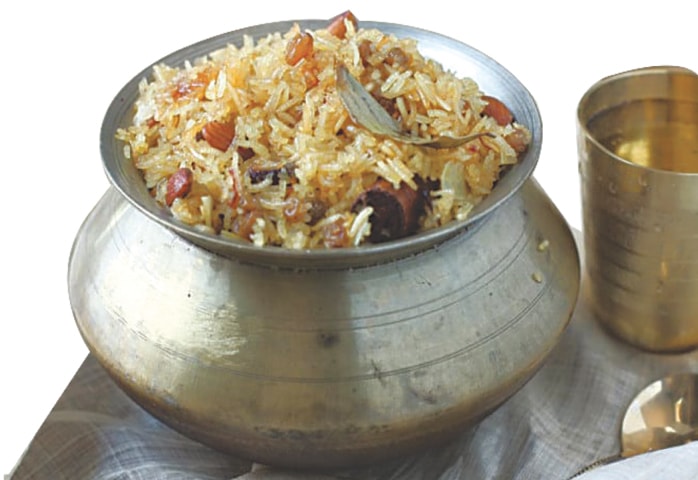
The land-locked valley of Kashmir is abundantly blessed with natural landscape that the eyes can feast on, a glorious climate, snow-covered peaks, bluish waters, rich cultural heritage and certainly for its mouth-watering traditional food.
Rogan Josh, Modur Pulav, Matschgand, Yakhni or Yoghurt Lamb Curry, Dum Olav, Kashmiri Muji Gaad, Aab Gosht, Goshtaba and many other delicacies of Kashmiri cuisine that will satisfy your appetite but whet your taste buds and make you crave for more.
What if you get an opportunity to taste all these lip-smacking dishes in one go? It is quite possible only if you try wazwan. And you should, at least once in your lifetime. Wazwan is a sumptuous multi-course meal in traditional Kashmiri cuisine which includes all kinds of delectable combinations. It is served on special occasions, such as weddings or engagement ceremonies but is also served at taaziat (condolences), chaarum or chahlum (40 days after death) to people who come for condolence. The ultimate formal wazwan, though, is a royal banquet.
Consisting of up to 30 different dishes, the Kashmiriwazwan is an unforgettable dining experience
In Koshur (Kashmiri) language, waz means ‘cook’ or ‘cooking’ and wan means ‘shop’. Wazwan comprises a minimum of seven compulsory dishes to a maximum of 30 dishes. Nearly 17 to 22 of the dishes are made with meat, depending on the situation and economic status of the host. It can easily become one of the richest as well as the costliest food presentations that is cooked and relished. Over centuries, wazwan has evolved in quality as well as quantity.
“I was surprised to learn about the Kashmiri culinary tradition of wazwan consisting of 30-plus dishes,” says Saddia Mazhar, an Islamabad-based journalist and social activist. “My university fellow, who belonged to Kashmir, once told me about it and we planned to taste it at another mutual Kashmiri friend’s home. It was indeed a wonderful experience as Kashmiri cuisine has its own unique distinctiveness evident of their hospitality.”

The history of wazwan can be traced back to the arrival of Muslims in Kashmir in the 14th century. Trained weavers, woodcarvers, architects, calligraphers and cooks from Samarkand also migrated with them. This created a sudden boost in the arts, crafts and food industry in the valley. As a result, Kashmiri cuisine expanded by bringing rich spices into use. However, some believe that wazwan came to Kashmir from Iran, along with the medieval rulers, Sufis and other Muslim preachers. The Muslims introduced saffron, dry fruits, Kashmiri red chillies, butter and clarified butter, garlic and tomatoes to Kashmiri cuisine.
The preparation and serving of this extravagant feast requires hours of endless cooking with skill and finesse. Wazwan is cooked in special nickel-plated copper vessels, over simmering wood fires. Kikar wood, used for cooking, is usually stored in a special temporary shed near the kitchen. Wazwan is cooked overnight under the supervision of a master chef locally called ‘vaste wazih’. When the guests arrive, they are seated in groups of four and share the meal out of a large copper platter called ‘traem’.

After the guests have washed their hands to sit for the meal, they are served rice or pulao topped with seekh kebab, tabakh maaz (twice-cooked mutton in ghee-rich gravy), zafran or safaid kokur (chicken in white or saffron sauce), methi qorma (chicken or mutton in a dry spice containing fenugreek), rogan josh — and other main course dishes keep coming in, one by one.
In Koshur (Kashmiri) language, waz means ‘cook’ or ‘cooking’ and wan means ‘shop’. Wazwan comprises a minimum of seven compulsory dishes to a maximum of 30 dishes.
The main course runs for an hour or so. The dishes are accompanied with six to eight kinds of lip-smacking chutneys, some of them rich with nuts and dry fruit. The end of the main course is signalled when the wazih brings in goshtaba, invariably the last entrée dish, which is a preparation of large meatballs cooked overnight with curd and other spices. In a way, this is the pièce de résistance of the menu, as the overall quality of the wazwan is judged by the preparation of goshtaba.

The main course is followed by dessert, such as firni, halwa and sweet beverages. Apart from the items mentioned above, some of the best-known dishes served in a wazwan spread are aab gosht, (a spicy lamb preparation), rista (mutton meatballs cooked in red gravy), methi maaz (a dish of lamb with a dominant aroma of fenugreek) and dani phol (another mutton dish).
Faisal Jameel Kashmiri, a caterer offering traditional Kashmiri dishes in Muzaffarabad, AJ&K says that, “because of the effort, time constraints and special skills required to prepare it, you cannot order a wazwan at a restaurant in Muzaffarabad. Lalazar Café, widely known for its delicious Kashmiri food, might be the only place that offers it.”

He says that migrants from India-held Kashmir, settled in different parts of AJ&K, used to prepare wazwan to mark special occasions. The quality of the wazwan served to the guests is somewhat of a status symbol as it reflects the host’s generosity and hospitality. Nevertheless, the wazwan is treated with great care, its preparation considered an art and it continues to be regarded as the pride of Kashmiri culture and identity.
Published in Dawn, EOS, September 9th, 2018














































